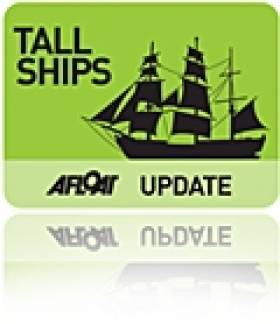Displaying items by tag: Waterford Tall Ship Races 20011
Norway's Oldest A-Class Tallship Sets Sail for Dublin
STV Statsraad Lehmkuhl is scheduled to arrive in Dublin Bay on Thursday afternoon where she will enter through the port's East-Link lift toll-bridge and berth at Sir John Rogerson's Quay. She departed Bergen last Thursday and is currently heading for Stornoway on the Isle of Lewis.
She was originally christened Grossherzog Fridrich August when completed at the J.C. Tecklenborgwerft yard in Bremerhaven as a sail training ship for the German merchant navy.
In 1923 she changed hands and began a career with the Norwegian Shipowners Association on the initiative of the state Kritoffer Lehmkuhl. The vessel was renamed in his honour due to Lehmkuhl's dedication to the cause of cadetship programmes and his contribution in creating an independent Norwegian government in 1905.
She was transferred to the Bergen Schoolship Association in 1924. After many years serving the association the vessel was donated in 1978 to the Statsraad Lehmkuhl Foundation, an organisation also based in the country's second largest city.
























































